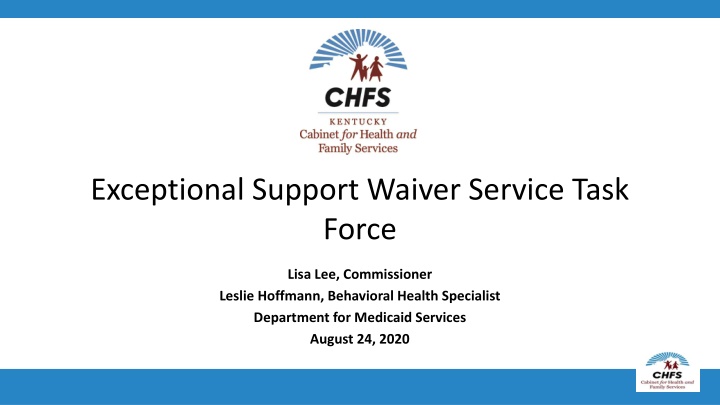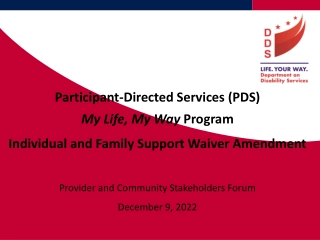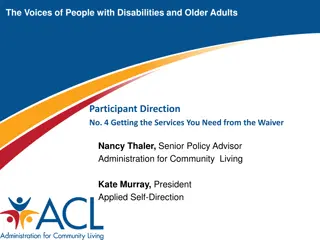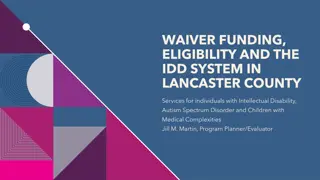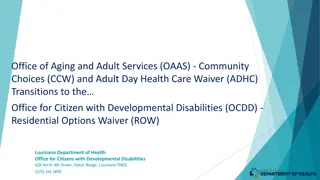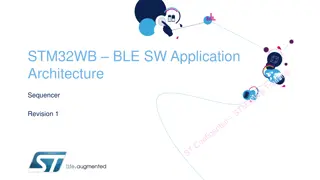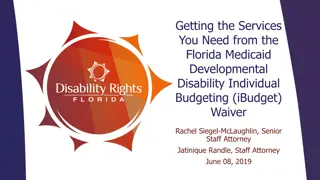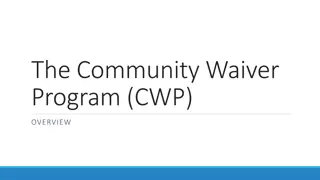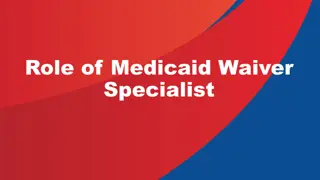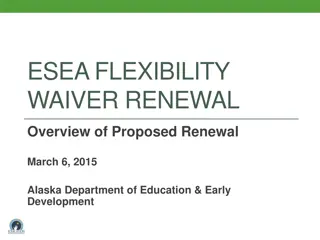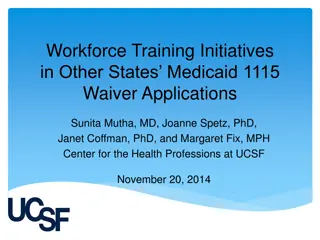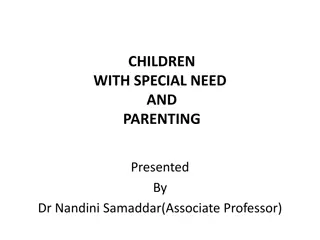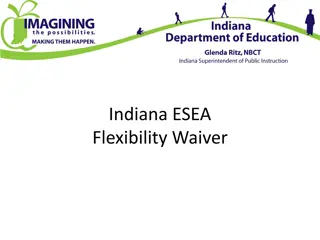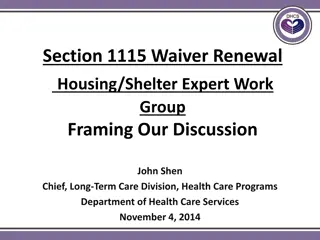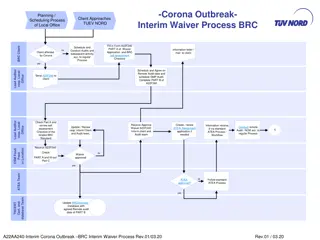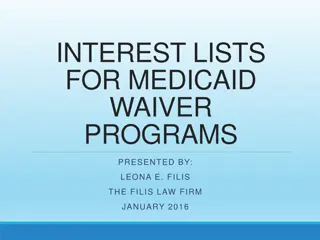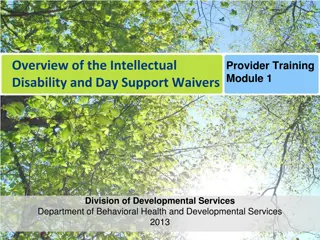Exceptional Support Waiver Service Task
Home and Community Based Services (HCBS) waivers provide individuals with disabilities an alternative to institutionalization by offering community-based care. States must adhere to specific guidelines, including budget neutrality and quality standards, to receive Centers for Medicare and Medicaid Services (CMS) approval for a 1915(c) HCBS waiver. Kentucky's 1915(c) HCBS Waivers cover various programs for different disability types with budgeting requirements and federal fund matching.
Download Presentation

Please find below an Image/Link to download the presentation.
The content on the website is provided AS IS for your information and personal use only. It may not be sold, licensed, or shared on other websites without obtaining consent from the author.If you encounter any issues during the download, it is possible that the publisher has removed the file from their server.
You are allowed to download the files provided on this website for personal or commercial use, subject to the condition that they are used lawfully. All files are the property of their respective owners.
The content on the website is provided AS IS for your information and personal use only. It may not be sold, licensed, or shared on other websites without obtaining consent from the author.
E N D
Presentation Transcript
Exceptional Support Waiver Service Task Force Lisa Lee, Commissioner Leslie Hoffmann, Behavioral Health Specialist Department for Medicaid Services August 24, 2020
1915(c) Home and Community Based Services (HCBS) waivers are designed to give individuals with disabilities an alternative to institutionalization. should complement available state Medicaid program services, public programs, and family/community supports to meet each individual s needs. should allow an individual to live safely in the community. If an individual s needs exceed what can be safely provided in the community, he or she may not be appropriate for waiver services. 2
To receive Centers for Medicare and Medicaid Services (CMS) approval for a 1915(c) HCBS waiver, states must: Provide the same level of care in the community as an individual would receive in an institution. Demonstrate the cost of care in the community is equal or less than an institution. This is known as budget neutrality. Conduct monitoring to ensure waivers meet the quality standards DMS told CMS it would meet. 3
Kentuckys 1915(c) HCBS Waivers: The Basics Acquired Brain Injury Long Term Care (ABI LTC) Acquired Brain Injury (ABI) ABI & ABI LTC: For individuals age 18 or older with an acquired brain injury MIIW: For individuals dependent on a ventilator 12 or more hours a day or on an active, physician monitored weaning program Home and Community Based (HCB) Model II Waiver (MIIW) HCB: For individuals age 65 and older or individuals of any age with a physical disability Supports for Community Living (SCL) MPW & SCL: For individuals with intellectual or developmental disabilities Michelle P. Waiver (MPW) 4
Kentuckys 1915(c) HCBS Waivers: Budgeting Waiver budgets are determined by evaluating expenditures from the previous fiscal years. Budgets must be cost neutral, per CMS. To be cost neutral, the average per participant expenditure must not exceed the average per person cost of furnishing institutional services for an individual with the same level of care. 5
Kentuckys 1915(c) HCBS Waivers: Expenditures* States receive matching federal funds for services provided in the home or community. CMS provides approximately 70% of funding for waiver services. Kentucky provides the remaining dollars. Not meeting CMS requirements for one waiver puts these funds at risk for ALL the waivers the state operates. Total Paid Claims Amount $23,035,476 $26,674,621 $159,288,787 $2,351,010 $342,408,962 $386,802,581 $940,561,437 Waiver ABI Acute ABI LTC HCB MW II Michelle P SCL Total *The numbers in this table represent calendar year 2019 Population Served 296 263 10,658 33 10,212 4,921 26,383 Federal Share $16,124,833 $18,672,235 $111,502,151 $1,645,707 $239,686,273 $270,761,807 $658,393,006 State Share $6,910,643 $8,002,386 $47,786,636 $705,303 $102,722,689 $116,040,774 $282,168,431 6
Kentuckys 1915(c) HCBS Waivers: Waiting Lists Waiver Waiver Year Funded Slots Active Slots* Waiting List ABI 1/1/20-12/31/20 383 281 0 ABI LTC 7/1/20-6/30/21 438 390 38 HCB 8/1/20-7/31/21 17,050 12,574 0 MIIW 9/1/19 8/31/20 100 40 0 MPW 9/1/19 8/31/20 10,500 10,150 7,305 SCL 3/1/20-2/28/21 4,491 4,774 2,891** *Number does not include slots assigned to individuals who are not currently accessing services **See following table for additional breakdown by category. Once an individual utilizes the slot by accessing at least one service, the slot will remain assigned to that individual for the entire waiver year. Even if the individual expires, the slot cannot be reallocated until the start of the next waiver year. 7
Kentuckys 1915(c) HCBS Waivers: SCL Waiting List Categories Emergency Urgent Future Planning Immediate services needed due to: Individual needs services within one year and: Has a threatened loss of existing funding source for supports due to age or eligibility Individual needs services within one year and: Abuse, neglect, or exploitation of the individual substantiated by DCBS is not currently receiving a service through another funding source and needs are being met Death of the individual s primary caregiver and lack of alternative caregiver Is in a temporary or inappropriate placement but health and safety is assured is not receiving services and does not currently need services Lack of appropriate placement due to loss of housing, loss of funding, or imminent discharge from a temporary placement Has a primary caregiver with diminished capacity due to physical or mental status and no alternative caregiver Is in the custody of DCBS Jeopardy to individual s health and safety due to the primary caregiver s physical or mental health status Exhibits an intermittent behavior or action that requires hospitalization or police intervention Imminent or current institutionalization 8
Kentuckys 1915(c) HCBS Waivers: SCL Waiting List Waiting List Category* Number Emergency 0 Urgent 128 Future Planning 2,763 *Category definitions on the following slide 9
Kentuckys 1915(c) HCBS Waivers: SCL Operations Acquired Brain Injury Long Term Care (ABI LTC) SCL Waiver DBHDID DAIL DMS Exceptional supports approval, waiting list management, review of incident reports and follow up, provider monitoring including certification, training and technical assistance Monitoring and quality assurance to maintain CMS approval of SCL waiver. Program review- create and revise policy Provider and participant activities related to participant-directed services Supports for Community Living (SCL) (PDS) 10
Exceptional Supports: By The Numbers Exceptional supports claims account for 3% of the total paid dollars for SCL participants. In calendar year 2019, 265 individuals were authorized for an exceptional supports but only 251 received the service based on paid claims data. The table below outlines this information. Waiver Service # Unique Individuals Authorized Total Paid Claim Amount Residential 163 $11,423,537 Consultative Clinical & Therapeutic Services 82 $277,612 Respite 6 $26,668 Supports for Community Living (SCL) Total 251 $11,727,817 In calendar year 2019, only one individual was denied exceptional supports. The denial was for lack of information. 11
Waiver Amendment Required (takes 9-12 months) Regulation Change Required (takes 5-10 months) KAPP/KARP Recommendation Response PAs can be extended to 12 months for ADT, and residential services. PAs for clinical services should not extend beyond six months to allow for monitoring of an individual s progress and potential need for additional wrap around supports. DMS also suggests a refresher training and quick reference guide to assist providers in submitting complete information at the time of initial request. Currently 39% of requests are returned to the provider at least one time for clarifications or additional information. Extend prior authorization (PA) to 12 months and establish an expedited renewal process DMS is currently evaluating the use of a validated, universal assessment tool and is open to suggestions on possible options. Use a single assessment tool Supports for Community Living (SCL) In addition to waiver services, individuals should receive Medicaid state plan services, services through public programs, and natural supports to meet needs. Those with a level of care beyond what the waiver can safely provide may not be appropriate for waiver services. Establish a higher level of care while retaining the exceptional supports system 12
Waiver Amendment Required (takes 9-12 months) Regulation Change Required (takes 5-10 months) KAPP/KARP Recommendation Response Revise the exceptional support rate methodology CMS requires states to have a documented, evidence-based rate methodology. Kentucky is working to establish a documented evidence- based rate methodology to support provider reimbursement levels. Increase the number of units allowed for Consultative Clinical and Therapeutic (CCT) Services Kentucky will evaluate this possibility, however, it is critical any increase in CCT does not create a duplication of services under the state plan as this is not allowed by CMS. SCL case managers received a 10% increase in their reimbursement rate in 2018. Establish an exceptional support rate for case manager Supports for Community Living (SCL) CMS requires states to have a documented, evidence-based rate methodology. Kentucky does not have one at this time and will need to establish one before creating any additional rate methodologies. 13
Lets work together! If you have ideas, comments, concerns, or questions, we want always to hear them. Supports for Community Living (SCL) Email us at MedicaidPublicComment@ky.gov. 14
